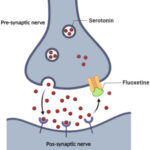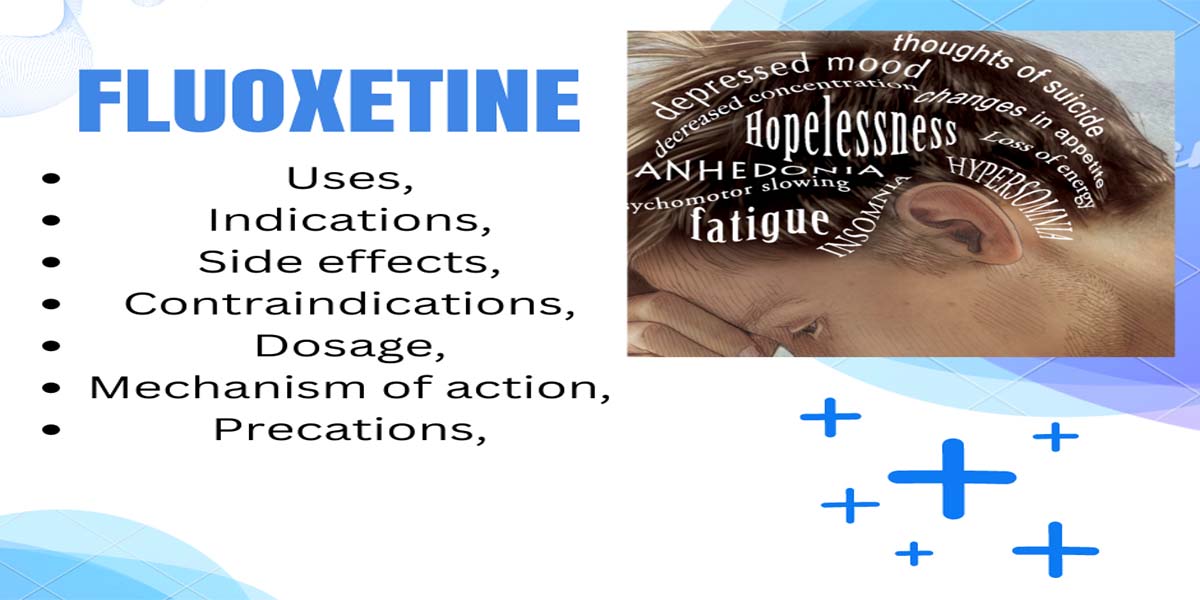What is Fluoxetine? Fluoxetine uses!
Before fluoxetine uses! fluoxetine is a Selective Serotonin Reuptake Inhibitor, also known as an SSRI. SSRIs are not considered narcotics (controlled substances), it doesn’t consider to have a high risk of addiction or abuse.
It’s one of the most prescribed antidepressant fluoxetine stimulates certain chemical messengers (neurotransmitters) that communicate between brain cells. It was the first SSRI that the U.S. Food and Drug Administration (FDA) approved to treat depression in adults, children and adolescents.
Indications of Fluoxetine:
Major Depression Disorder,
Obsessive-compulsive disorder,
Panic attacks/Disorder.
Other uses of Fluoxetine:
Fluoxetine is also sometimes used to treat alcoholism, attention-deficit disorder, borderline personality disorder, sleep disorders, headaches, mental illness, posttraumatic stress disorder, Tourette’s syndrome, obesity, sexual problems, and phobias.
Side effects of Fluoxetine:
Common side effects are:
Dry mouth,
Nausea and vomiting,
Headache,
Diarrhea,
Sexual dysfunction,
Weight gain or loss,
Insomnia,
Fatigue,
Serious side effects:
Serious side effects and their symptoms can include the following:
- Serotonin syndrome. Symptoms can include:
- agitation (feeling aggravated or restless)
- hallucinations (seeing or hearing something that isn’t there)
- problems with coordination
- racing heart rate
- overactive reflexes
- fever
- nausea
- vomiting
- diarrhea
- Abnormal bleeding. Symptoms can include:
- bruising or bleeding more easily than normal
- Mania. Symptoms can include:
- greatly increased energy
- severe trouble sleeping
- racing thoughts
- reckless behavior
- unusually grand ideas
- excessive happiness or irritability
- talking more or faster than normal
- Seizures
- Low salt levels in your blood. Symptoms can include:
- headache
- weakness
- confusion
- trouble concentrating
- memory problems
- feeling unsteady
Contraindications:
- Monoamine oxidase inhibitors (MAOIs), such as isocarboxazid, phenelzine, and tranylcypromine. You shouldn’t take fluoxetine if you take an MAOI or if you’ve stopped taking an MAOI within the last two weeks. Don’t take an MAOI within five weeks of stopping fluoxetine. Taking these drugs too close together could cause serious and life-threatening side effects. Symptoms include high fever, constant muscle spasms that you can’t control, and stiff muscles. They also include fast changes in your heart rate and blood pressure, confusion, and unconsciousness.
- Thioridazine. You shouldn’t take these drugs together. Don’t take thioridazine within five weeks of stopping fluoxetine. Taking these drugs together can cause serious heart rhythm problems. These problems can cause you to die suddenly.
- Pimozide. You shouldn’t take these drugs together. Fluoxetine can cause the levels of pimozide to increase in your body. This raises your risk for heart rhythm problems.
Fluoxetine uses and Pregnancy/Brestfeeding:
Talk to your doctor if you’re pregnant or plan to become pregnant. Research in animals has shown adverse effects to the fetus when the mother takes the drug. There haven’t been enough studies done in humans to be certain how the drug might affect the fetus. This drug should only be used if the potential benefit justifies the potential risk. The FDA warned in 2006 that SSRIs including Fluoxetine can increase the risk of fetal heart complications when taken during the last half of pregnancy.
This drug may pass into breast milk and may cause side effects in a child who is breastfed. Talk to your doctor if you breastfeed your child. You may need to decide whether to stop breastfeeding or stop taking this medication.
Fluoxetine Dosage:
The dose of this medicine will be different for different patients. Follow your doctor’s orders or the directions on the label. The following information includes only the average doses of this medicine. If your dose is different, do not change it unless your doctor tells you to do so.
If you miss a dose of this medicine, take it as soon as possible. However, if it is almost time for your next dose, skip the missed dose and go back to your regular dosing schedule. Do not double doses
The initial and recommended dosage of fluoxetine is 20mg per day.
Maximum dosage of fluoxetine is 80mg per day in adults under 18 to 64

Mechanism of action:
The monoaminergic hypothesis of depression emerged in 1965 and linked depression with dysfunction of neurotransmitters such as noradrenaline and serotonin. Indeed, low levels of serotonin have been observed in the cerebrospinal fluid of patients diagnosed with depression. As a result of this hypothesis, drugs that modulate levels of serotonin such as fluoxetine were developed.
Fluoxetine is a selective serotonin reuptake inhibitor (SSRI) and as the name suggests, it exerts it’s therapeutic effect by inhibiting the presynaptic reuptake of the neurotransmitter serotonin. As a result, levels of 5-hydroxytryptamine (5-HT) are increased in various parts of the brain. Further, fluoxetine has high affinity for 5-HT transporters, weak affinity for noradrenaline transporters and no affinity for dopamine transporters indicating that it is 5-HT selective.
Fluoxetine interacts to a degree with the 5-HT2C receptor and it has been suggested that through this mechanism, it is able to increase noradrenaline and dopamine levels in the prefrontal cortex.
Precautions:
It is important that your doctor check your progress at regular visits, to make sure this medicine is working properly. Blood tests may be needed to check for unwanted effects.
Do not suddenly stop taking this medicine without checking first with your doctor. Your doctor may want you to gradually reduce the amount you are using before stopping it completely. This will decrease the chance of having withdrawal symptoms such as agitation, breathing problems, chest pain, confusion, diarrhea, dizziness or lightheadedness, fast heartbeat, headache, increased sweating, muscle pain, nausea, restlessness, runny nose, trouble sleeping, trembling or shaking, unusual tiredness or weakness, vision changes, or vomiting.
Check with your doctor right away if you have decreased interest in sexual intercourse, delayed or inability to have an orgasm in women, inability to have or keep an erection in men, or loss in sexual ability, desire, drive, or performance. These could be symptoms of sexual dysfunction.

